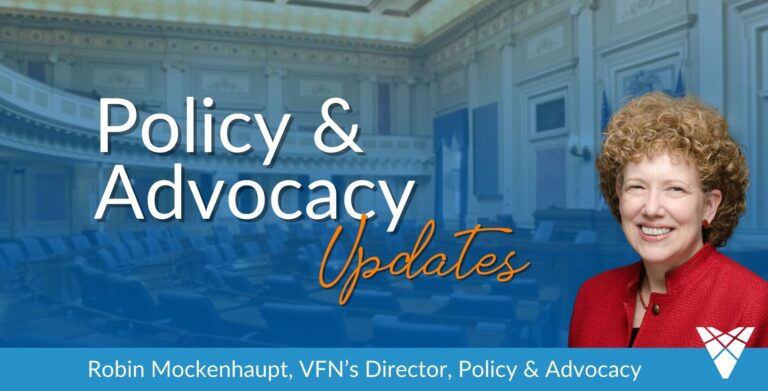A blog post by Robin Mockenhaupt, VFN’s Director, Policy & Advocacy

National Policy News
One of the questions I’ve asked myself since I’ve had the pleasure of working with VFN is, “what do other groups like ours do in policy and advocacy?” We are a philanthropy-serving organization (PSO) and as a network of Virginia funders, we play a unique role in the social sector. There are nearly 100 groups like ours – national, regional, and state organizations – representing more than 7,000 funders across the country. The United Philanthropy Forum (UPF) is our national membership organization, and one of the key places where we go to learn more about what is happening in US philanthropy. So, for the past four years I have engaged with the Forum to learn more about what UPF and other PSO’s are doing around policy and advocacy issues.
Every two years, UPF establishes a Public Policy Framework for the new Congress. The 119th Congress began its work just a few weeks ago, and there is a new 2025-2026 framework and agenda. All the priorities in the 2025-2026 version support both our philanthropic sector strength and community well-being. There are five core policy priorities, that advocate for:
- Advancing charitable giving and fair tax policy: enhancing charitable giving through tax policies that promote both sector strength and broad-based community impact, ensuring philanthropy can work in and with communities across the nation (e.g., encouraging transparent dialogue about donor-advised funds and their role in charitable giving).
- Strengthening public-philanthropic partnerships: strategic alignment between sectors while preserving the independence and innovative capacity of philanthropic organizations (e.g., advocate for streamlined processes that facilitate cross-sector collaboration).
- Safeguarding democratic participation: policies that protect and enhance democratic participation while preserving the unique role of nonprofits in civic life (e.g., defend nonprofit nonpartisanship while protecting advocacy rights).
- Promoting fair health access: approaches that address both immediate access needs and underlying social determinants of health, with particular attention to communities that are historically underserved (e.g., advocate for policies that address disparities and advance equitable health outcomes).
- Supporting environmentally sustainable communities: environmental policies that recognize and address disparities while promoting sustainable solutions for all communities (e.g., promoting disaster preparedness and resilient community recovery).
I know we will discuss these policies at Foundations on the Hill (FOTH), the largest gathering of philanthropists on Capitol Hill, which will be held February 23-26 at the JW Marriott in Washington, DC. I will attend, as will several VFN members, and I hope to see you there. The early bird registration deadline is January 31st!
THIS week UPF will be holding #FOTH25 Orientation and Prep Briefing on Thursday, January 23rd at 4pm. Click here to register if you plan on joining or are interested in joining FOTH this year.
Virginia Policy News
Now that the Virginia General Assembly (GA) is back in session, we’ve turned our attention to what is happening in Richmond. In 2025, VFN is partnering with member the Center for Nonprofit Excellence (CNE), to co-fund a bill tracking service for the 2025 General Assembly session. During the session (scheduled for 45 days this year) we will highlight a couple of bills each week in VFN publications, to keep members aware of proposed legislation that may impact the communities in which you work.
Three bills that have been introduced cover issues of economic development, affordable housing, and an expansion of the Earned Income Tax Credit (EITC).
- HB2397: This bill expands eligibility for GO Virginia Regional Councils to receive Virginia Growth and Opportunity Grants and would allow regional councils to apply for and utilize grant funds for regional activities not described in, but related to the core objectives of, the council’s economic growth and diversification plan. Such activities may include (i) child or senior care, (ii) general health care, or (iii) creative entrepreneurship. Any regional council seeking to utilize funds for such purposes shall detail in its grant application how such use of funds will further the objectives described in such plan and improve the score utilized by the Growth and Opportunity Board in making grant fund allocations. It was sponsored by Delegate Glass and has been referred to the Committee on General Laws.
- HB1701: This bill extends the housing opportunity tax credit sunset date to 2030 (currently is 2025). It also requests an increase in credit caps to cover affordable housing projects, and is a recommendation of the Virginia Housing Commission. It was sponsored by Delegate Bulova and referred to the Senate Finance Committee.
- SB 782: This bill removes the current 1/1/2026 expiration date for the standard EITC deduction of $8,500 for single individuals and $17,000 for married individuals. If not passed, the rates would revert back to the amounts from 2019, then $3,000 for single individuals and $6,000 for married individuals. It was sponsored by Senator Sutterlien and has been referred to the Committee on Finance and Appropriations.
We’ll be highlighting more proposed legislation in future communications.
VFN Members’ Involvement in Policy and Advocacy
It’s important for VFN members to know what they can do related to advocacy, both for themselves and in support of nonprofits. We’re planning a breakout session on policy and advocacy at the upcoming VFN annual conference in Loudoun County, VA from April 28-30. Registration opens soon and we hope to see you there!
In upcoming blogs, we hope to highlight members’ 2025 policy agenda. If you are a VFN member and have a policy and advocacy agenda, we’d love to know what you are focused on! Please send an e-mail to Robin Mockenhaupt at robin@vafunders.org.